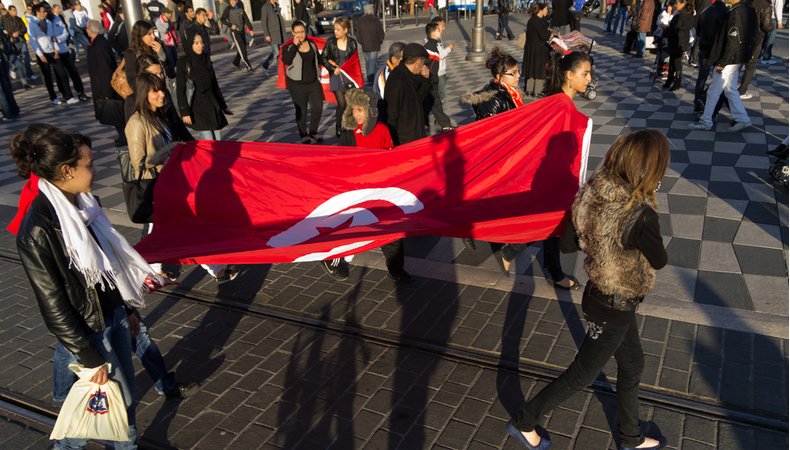In Tunisia, anger against unpunished police violence is growing

About 100 people demonstrated on Friday in the Tunisian capital against police violence, following last week’s protests. Protesters, especially young people, claimed their right to speak freely and demanded an account of the last two episodes of violence by the police that had sparked a few nights of protest.
A young man named Ahmed died during an arrest, while another, named Fadi, was beaten by police in the middle of the street. An investigation into the death of the former was opened and the police officer responsible for the beating of the latter was suspended. The Tunisian Prime Minister, Hichem Mechichi, was to be heard in parliament on these events, but his hearing has not yet taken place.
The protests in the capital Tunis have been going on intermittently for weeks. In the working-class district of Sidi Hassine, several dozen young people threw objects and fireworks at a police station, which responded by throwing tear gas. The demonstrations in this neighborhood erupted two weeks ago after the death of a man accused of drug dealing. The family accused the police of beating him to death and the authorities opened an investigation, but on Thursday the Ministry of the Interior denied any responsibility of the officers.
Politics or crime? The debate is repeated every time there are social clashes without explicit demands. The liquidation of the demonstrations is a way of justifying the use of force and inhibiting empathy towards the victims. It also allows organizations to claim the monopoly of the word and historians to limit their gaze to the higher spheres of society. “Protests take place during the day in front of the palaces of power,” Walid Hakima, spokesman for the National Security Directorate General, commented on Saturday evening on the news.
Yet, by their very nature, riots are not wisely ordered according to the frameworks defined by the law. That a criminal qualification can be applied to an act does not exclude its political significance. Now, as far as the current movement is concerned, this is obvious. First, for the reasons. The peri-urban geography of the clashes designates the areas where the informal economy and precarious work are the primary sources of subsistence, precisely the most impoverished by the closure.
In this survival economy, theft tends to become a complementary resource. A new, albeit short-lived, closure and a tougher curfew would further exacerbate these difficulties. Under these conditions, the historical relations between the police and the youth of the popular neighborhoods can only worsen. The police response to the protests of the young supporters of the Club Africain, the previous week, increased the dose.
The confusion of the political class – unable for ten years to keep the promises of equality, integrity, and dignity of the revolution – adds to the distrust of the state and the loss of trust in representative institutions. The “people”, the part of society that the institutional “representation” does not represent, thus refreshes the memory of its rulers. The UGTT trade union, the Tunisian Forum of Economic and Social Rights, and the Tunisian Association of Young Lawyers (ATJA) have highlighted in their respective press releases the responsibility of post-2011 governments about the deterioration of the social situation, the aggravation of corruption, and “the deviation of the revolution towards the interests of the lobbies” (ATJA).
The UGTT believes that “settling for repressive solutions, pushing the security and military apparatuses to confront the population, will not solve the problems of hundreds of thousands of marginalized young people”. The union equally asks protesters to renounce looting, damage, and “night demonstrations, due to possible infiltrations and excesses”.
The ATJA appeals to “national organizations and all living forces to coordinate immediately and urgently to structure the demonstrations, correcting their objectives”.These demonstrations also show how organizations invested with the mission of carrying out the goals of the revolution have failed to articulate popular frustrations into a political platform. Exasperated young people are unlikely to listen more to them than to public authorities.




